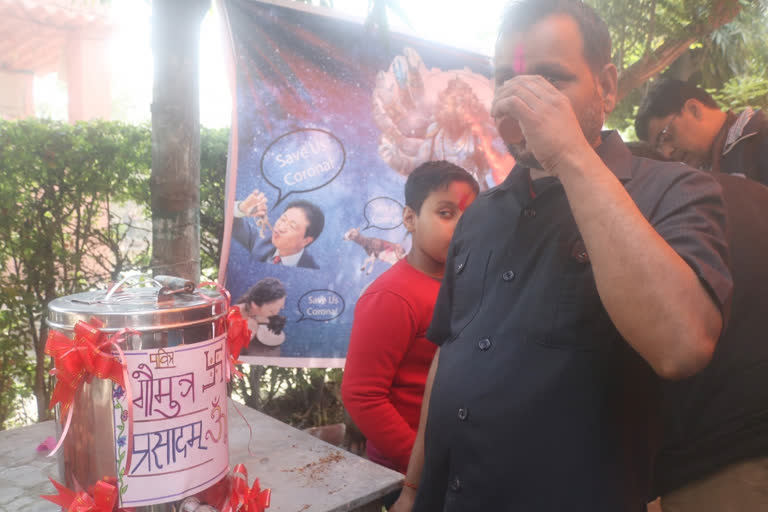Hyderabad: When US President Donald Trump said there was a possibility of ingesting disinfectant as a remedy against Coronavirus, he was joining a long line of leaders who have been science deniers. So long that their history stretches back to the time of Galileo Galilei, father of modern science, who was indicted by the Roman Catholic Church for his views on heliocentrism, which they believe contradicted the scriptures.
As Mario Livio, Israeli-American astrophysicist says in a new book, Galileo and the Science Deniers: "In a world of governmental anti-science attitudes, unnecessary conflicts between science and religion, and the perception of a widening schism between the humanities and the sciences, Galileo Galilei's tale serves, first of all, as a potent reminder of the importance of freedom of thought."
Yet while the Coronavirus rages on, the other global pandemic, of science denial, also seems be unchecked. Brazilian President Jair Bolsonaro has been called Trump of the Tropics for more than one reason -- one of them being his denial of Coronavirus as a global pandemic, and his description instead of it as a "little flu" and a "cold". Brazilians "never catch anything," according to him, even when they dive into "sewage", and they may have already developed the "antibodies" to stop the virus' spread, he has said. But then he also sacked the head of the space agency for deforestation data, calling it a lie.
Over in England, Prime Minister Boris Johnson missed five key Cobra meetings on Corona Virus, before falling ill with it himself -- but his attitude towards the pandemic is not unusual given his scepticism on climate change. Climate science denial groups, it turns out, were the largest donors to his 2019 election campaign. There have been others in this elite club of science deniers, from Cambodian strong man Hun Sen who berates people for wearing masks to Mexican president Andres Obrador who believes his "strong moral character" prevents him from getting infected.
In his new book, Livio reminds us that we have been here before with Galileo. "The disdain for and enmity to science we are experiencing today is precisely the type of attitude Galileo was fighting against. Through his attempts to separate science from the interpretation of Scripture and his reading of the laws of nature from experimental results, rather than associating them with a certain "purpose," Galileo was one of the first to implicitly introduce the idea that science compels us to take responsibility for our own destiny, as well as our planet's," he writes.
Read:When it comes to pandemics, reel life is ahead of reality
India too has not been untouched by the global pandemic of denialism, a term coined by science writer Mark Hoofnagle, who said denialists used the same five tactics against a range of topics, from climate change, evolution, to HIV/AIDS: conspiracy, selectivity (cherry picking), fake experts, impossible expectations (also known as moving goalposts) and general fallacies of logic. This kind of denialism has seen a former senior minister rubbishing Darwin's theory of evolution, and a spiritual guru with a large television following saying HIV can be "cured" with yoga. It has also seen a BJP MLA from Assam endorsing cow urine as part of a potent mixture to combat the virus.
In today's locked down world thanks to the Corona Virus pandemic, Tata Institute of Fundamental Research professor Arnab Bhattacharya notes what is more worrying is the "infodemic" of outright incorrect information, ranging from harmless but false, to potentially life-threatening, that spreads on TV channels, WhatsApp and Twitter faster than the virus. "And to make it worse," he adds, "we have dunderheads like Donald Trump whose statements are beyond bizarre. The fact that he can make brazen statements about injecting disinfectants and actually get away with it is a result of a worrying culture of science denial that has crept through modern society--be it in the US or even in India, which prides itself on having scientific temper enshrined in its Constitution. But from climate change to GM crops, and from belief in homoeopathy to miracle cures, science denialism is itself an epidemic that has slowly spread across the world."
Read:COVID-19 India tracker: State-wise report
It is easy to mix up correlation and causation, it is easy to cherry pick data, it is easy to selectively look at statistics. Especially for a culture steeped in reverence to authority and "elders", it can be difficult or even dangerous to call out or challenge statements. We're not encouraged to ask "Why?" even in school, and that starts this whole process, of treating science as that unfortunate subject to be forgotten after school exams, and not a way of making sense of the world we live in. In his iconic play, Life of Galileo, Bertolt Brecht wrote: Thinking is one of the greatest pleasures of the human race.
Sadly we live in a world where increasingly Indians are retreating into the past to point to scientific achievements such as plastic surgery and the invention of zero rather than celebrating true contemporary achievements such as making indigenous satellites and some of the world's most inexpensive life-saving drugs. At a time when the world's most powerful leader's distrust of science has seen the slashing of the Centers for Disease Control and Prevention budget by $15 billion in 2018 and the reduction of its contribution to global disease prevention by 80 per cent, it is important that other leaders don't get infected with this other pandemic of covidiocy.
(Kaveree Bamzai, a recipient of the Chevening Scholarship has formerly worked with The Times of India and The Indian Express and has been the editor of India Today. She is also a member of the CII National Committee for Women's Empowerment and Committee on Media and Entertainment)
